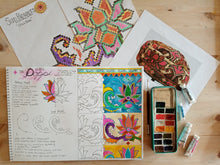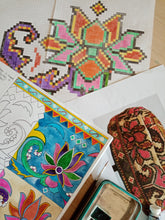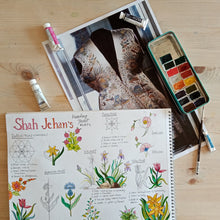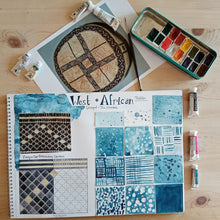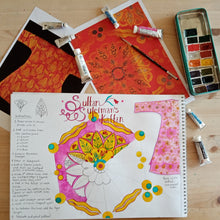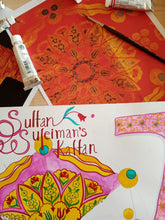
Imperial Threads
4 Part Online Series
Dates: Saturdays March 7th, 14, 21, 28 2021
Course Description: In this online class we will explore the textiles that once clothed the great sultans and emperors from across the Islamic world. Each class will feature a curated historical contextualization of the chosen site and patterns. Each class will be centered around patterns unique to each chosen fabric, textile or garment. Biomorphic(vegetal) and geometric patterns will be explored in order to complete the patterns or compositions. This class can be enjoyed by beginners and novices. In each session, careful instruction and handouts are given to make sure each student understands and can work toward finishing the patterns taught in class.
Workshop ONE: The Uzbek Doppi (Biomorphic)
Workshop TWO: Shah Jahan's Hunting Jacket (Biomorphic)
Workshop THREE: West African Fabrics and Prayer Caps(Geometry, Biomorphic)
Workshop FOUR: Sultan Sulaiman’s Kaftan (Geometry and Biomorphic patterns)
Workshop ONE: The Uzbek Doppi (Biomorphic patterns)
This class will focus on identifying and recreating the motifs and patterns found on the doppi commonly worn throughout the Central Asian region. Students will use a grid to learn how to plot the pattern cartoon. We will then work on the individual biomorphic pattern elements that can be repeated and completed by the student after class. Colour options and finishing the pattern will be discussed and demonstrated in class so that students can feel at ease when it comes time for to assemble and complete their compositions.
Workshop TWO: Shah Jahan’s Hunting Jacket (Biomorphic Patterns)
This class will focus on the beautifully embroidered hunting jacket previously won by Emperor Shah Jahan. Students will learn to create biomorphic and animal motifs from a section of the original silk embroidery. We will discuss the history of botanical drawing within Mughal Art history and learn some of the symbolism behind the motifs that appear on the Hunting Jacket..
Workshop THREE: West African Fabrics and Prayer Caps (Geometry, Biomorphic Patterns)
This class will focus on the fabrics of West Africa (primarily Senegal) as well as some of the prayer caps that feature intricate geometric patterns. This class is the first of its kind that aims to highlight an area of the Islamic Art tradition that isn’t discussed. We will look at the patterns and dyeing techniques used to create the fabrics. We will aim to recreate them using different watercolour techniques, wax/ rubber resists, as well as geometry to analyze the prayer cap motifs.
Workshop FOUR: Sultan Sulaiman’s Kaftan (Biomorphic patterns)
This class will focus on the Bursa silk fabrics and garments that were produced for the sultans and their families to wear inside the palace. We will look at the history of the Silk Road and how it affected the textiles of the Ottomans. We will construct the motifs from one of the ceremonial kaftans and learn how the pattern is repeated to create a composition.
When?
This class has been previously recorded. A google link drive will be sent to you with all class materials and instructional videos.
Location?
Online (on Zoom)
Please Note: All classes will be recorded
Questions?
Please email: laurelie.rae@gmail.com
Recommended materials list.
Watercolour paper- hot press is more desirable as the surface is less textured.
Watercolour brushes- Proart and Roubloff brand, These are Kolinsky brushes and I use them in sizes 2, 3, 4, 6
You can use synthetic brushes also, they are more economical and cruelty free. Some good brands include Winsor and Newton Cotman, karin sanat as a nice set of synthetic brushes in their Davinci line.
Watercolour paints, pencils and gouache/ ink
I use a combination of Kuretake, Winsor and Newton (Cotman line is a great set for beginners) as well as Holbein Watercolours, Schminke( High end professional) as well as handmade paints from pigments I have made myself.
For watercolour pencils, I use Koohinoor and Caran D'ache
Small pot or pan of white gouache
White wax candle (birthday candles or white crayons work well)
Drawing gum, pebeo and schminke brands are good
Compass
Ruler
Mechanical (0.5) or lead pencil (HB and softer such as a 2B or 4B
Erasers, white vinyl and kneadable erasers
Fineliners/ black pen- I use stabilo brand and they are long lasting.
Masking tape
Tracing paper- I suggest rolls rather than individual sheets but if you can only get sheets that use what you have.
A3 and A4 cartridge paper or multi purpose sketchbook paper.
A3 and A4 printer paper or a sketchbook to work with in class.
Please wear comfortable clothing and set yourself up in a comfortable location. Snack, water, class materials, fully charged electronic devices so that you can enjoy the class to the fullest






